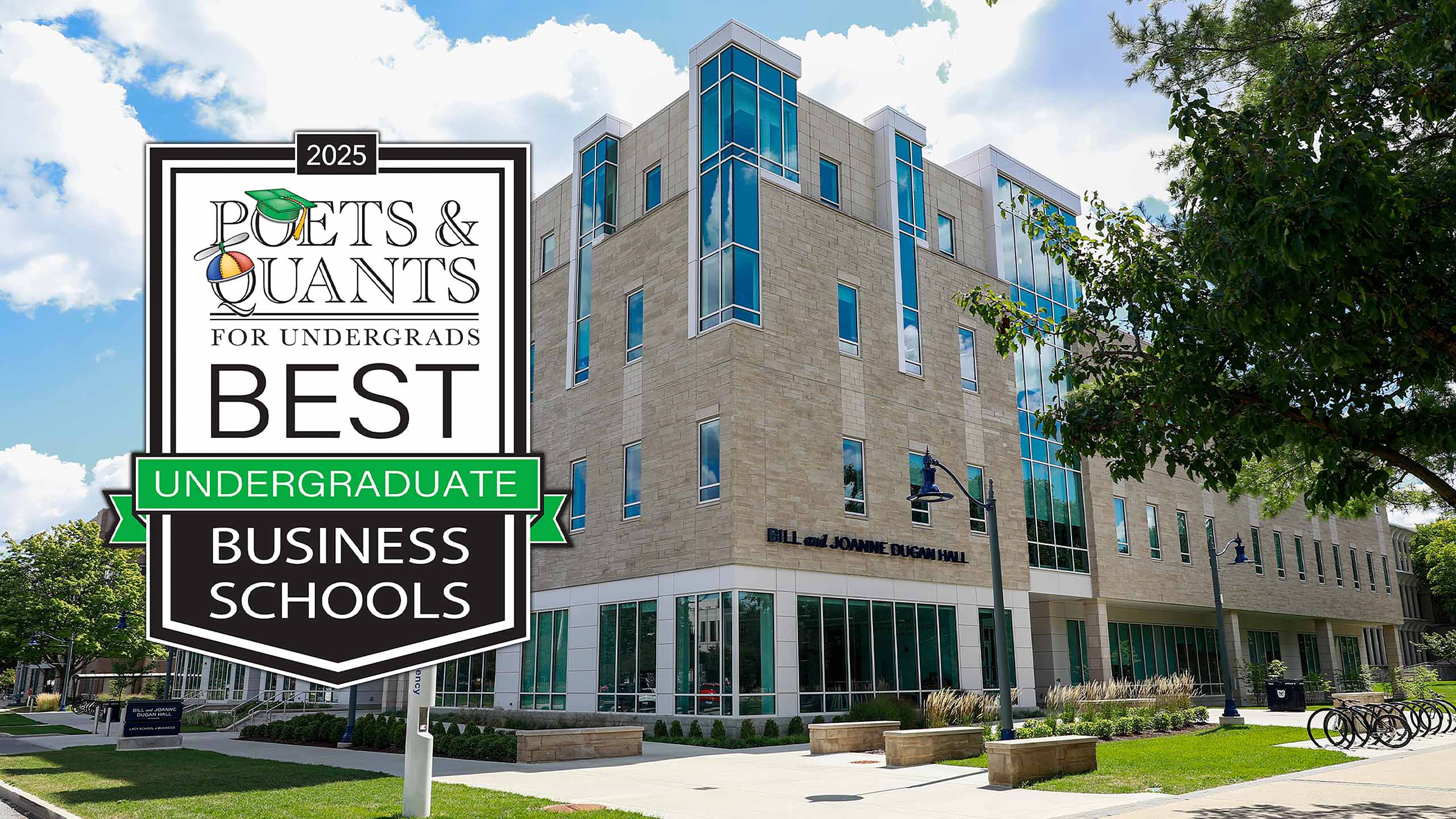Butler University’s Lacy School of Business (LSB) is once again in the national spotlight. In the 2025 Poets&Quants Best Undergraduate Business Schools rankings, LSB was ranked No. 1 in the country for Effectiveness of Career Advising, No. 2 for Quality of Teaching, No. 8 for Best Undergraduate Academic Experience, No. 36 for Career Outcomes, and No. 48 overall among business schools. These results highlight the strength of an approach built on one simple principle: business education works best when students don’t just learn about it—they live it.
From their first semester on campus, LSB students are immersed in signature experiences that blend classroom learning with real-world application. By the time they graduate, every Bulldog has consulted for a nonprofit, launched and run a start-up, and completed at least two professional internships. The result: a track record of career success and alumni who leave Butler confident, capable, and ready to make an impact.
“Our promise is that students will graduate with much more than a degree,” says Craig Caldwell, Dean of the Lacy School of Business. “They’ll leave with a diverse portfolio of real experiences—consulting, starting businesses, interning, and more—that prove they can solve problems, lead teams, and deliver results in the real world. That’s the difference an LSB education makes.”
The Signature Experiences
LSB’s model is anchored in a sequence of hands-on courses and requirements that have become hallmarks of the program.
- First-Year Business Experience introduces students to the fundamentals of business through real-world projects. Working in teams, students are assigned a company, research a sustainability-related challenge, and develop innovative solutions to present at the end of the course.
- Real Business Experience (RBE) has all sophomores design, launch, and manage an actual business. Teams pitch ideas, raise capital, run operations, and eventually close their ventures. Many report that the lessons learned in RBE are the most memorable—and humbling—of their college career.
- Internships are built into the curriculum, guaranteeing that every student gains professional experience before graduation. With Indianapolis as a backdrop, opportunities span Fortune 500 companies, start-ups, healthcare systems, sports franchises, and nonprofits.
- Capstone projects round out the sequence, often in the form of consulting engagements, simulations, or international collaborations that challenge students to apply their cumulative learning in complex settings.
“These experiences are not window dressing—they are central to how we define business education at Butler,” Caldwell explains. “Students are tested in situations where the stakes are real, and they emerge more confident and more resilient.”
Learning by Leading: Jenna’s Story
For senior Marketing and Entrepreneurship major Jenna Burd, the Real Business Experience was more than a class—it was the launchpad for everything that came next.
As a sophomore, Burd served as CEO and Vice President of Sales for her RBE team, which created a Butler-themed novelty calendar. With a $1,000 seed loan, her team built the project from scratch.
“It was my first time really leading a team and having to be the connector,” Burd recalls. “I had to figure out how to delegate, how to leverage people’s strengths, and how to make sure they were satisfied with their work. You can’t build a company by yourself—you have to have a team with you.”
The experience proved pivotal. “Because of that class, I became a three-time business owner,” she says. “Not a lot of other schools would give you that kind of opportunity as a sophomore.”
Today, Burd runs Yalla Solutions, a digital-first fractional CMO and creative agency that supports start-ups with marketing leadership. She credits her success to the Butler entrepreneurship ecosystem and the mentors who guided her.
“My coursework and the faculty here pushed me to explore new areas of marketing and business,” she says. “When I graduate, I won’t just leave with a degree—I’ll leave with real businesses, real networks, and real lessons that will carry me forward.”
Nick Smarrelli, Lecturer in Entrepreneurship and Director of Butler’s Entrepreneurship Program, has seen firsthand how students like Jenna flourish.
“Experiential learning lets students get out of the classroom, expand their perspective, and solve real problems beyond the Butler bubble,” Smarrelli says.
He emphasizes that student-run businesses like campus-based Chimba Bowls and Butler Brew are more than just projects. “They employ peers, generate revenue, and teach leadership in a way that no textbook can. And that’s why employers like Butler graduates—our students already know what it takes to lead and deliver results.”
Outcomes Speak for Themselves
The LSB approach is more than a learning philosophy—it’s a proven strategy. For more than a decade, Butler’s business graduates have achieved a near-perfect placement rate, with 98–100 percent securing jobs or graduate school admission within six months of Commencement.
Employers consistently cite Butler graduates’ ability to contribute immediately. “They’re not just ready for their first job—they’re prepared for a lifetime of adapting to change,” Caldwell notes. “That adaptability comes from our insistence on giving them real-world experience from day one.”
While national recognition from Poets&Quants affirms the LSB model, Caldwell is quick to emphasize that rankings are not the goal. “The goal is transformation,” he says.
“Our students walk in as eager, curious young people and walk out as professionals who know themselves and know how to lead.”
Butler’s Lacy School of Business is proving that the best way to learn business is to do business. And for the Bulldogs who live that philosophy, the result is more than a top-ranked education—it’s a launchpad for a lifetime of leading and learning.


